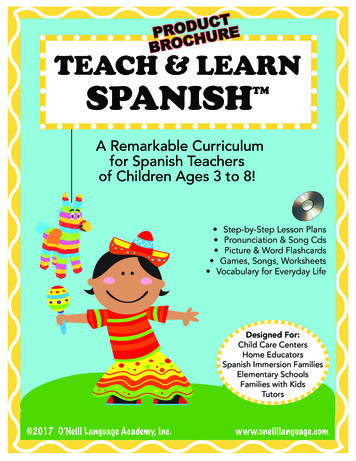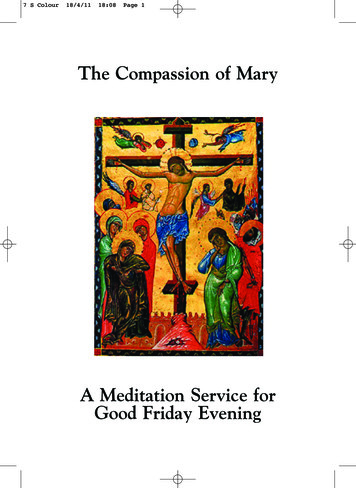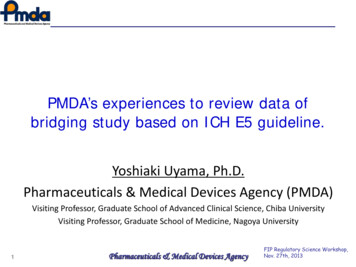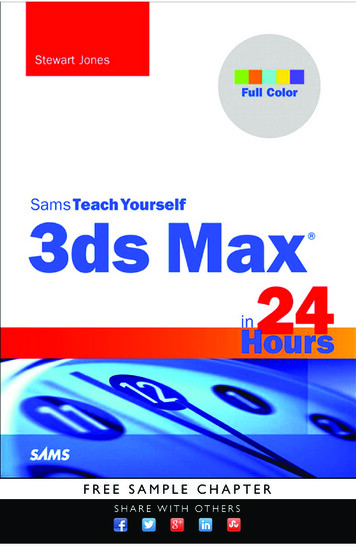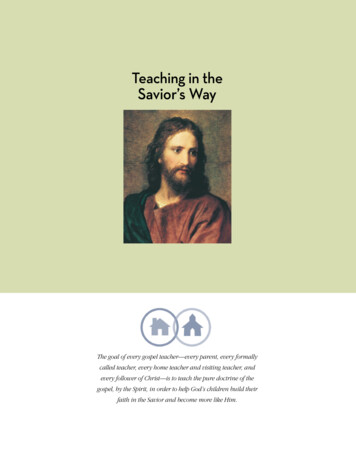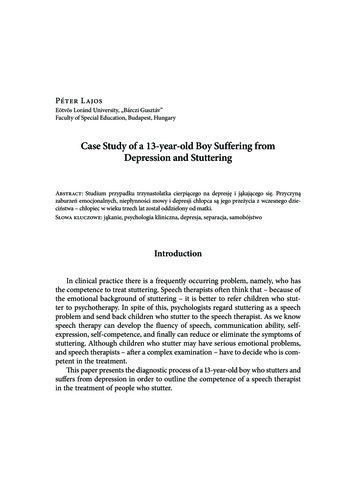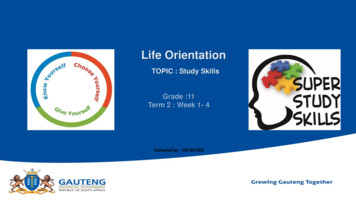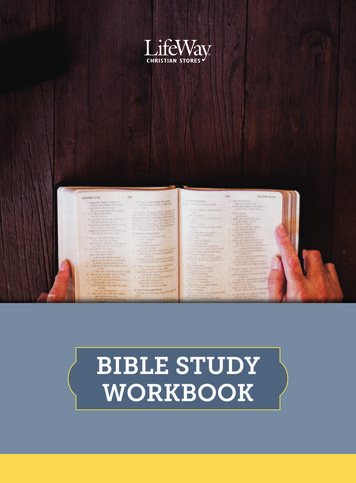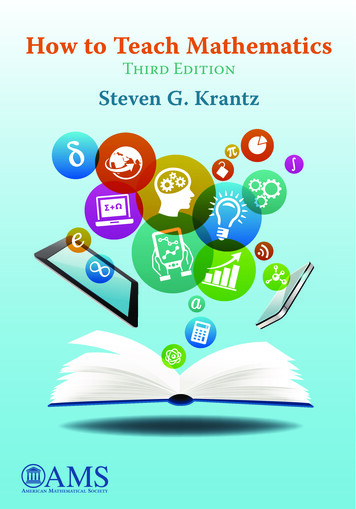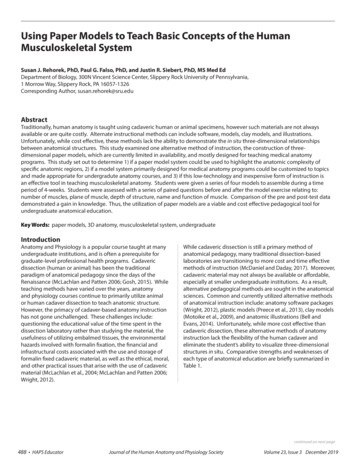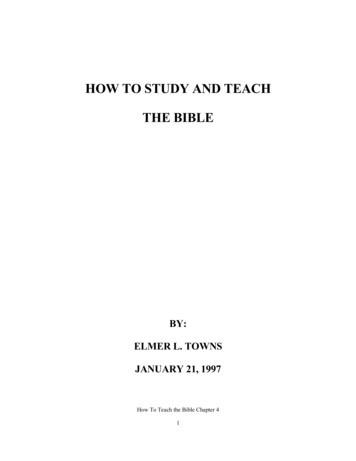
Transcription
HOW TO STUDY AND TEACHTHE BIBLEBY:ELMER L. TOWNSJANUARY 21, 1997How To Teach the Bible Chapter 41
TABLE OF CONTENTSHow to Study and Teach the Bible1.STUDYING THE BIBLEWhy do we teach the Bible? What is teaching? What happens in the lives of our students when weeffectively teach the Bible?2.STUDYING BIOGRAPHIESWhy should a teacher consider teaching biographies? How does one study a biography? What does abiographical lesson look like?3.STUDYING DOCTRINEWhy should a teacher consider studying Bible doctrine? How does one study a doctrine from the Bible? Whatapproach should be taken when teaching the Bible doctrinally?4.STUDYING THE BIBLE DEVOTIONALLYWhat value is there in studying the Bible devotionally? How does one discover the devotional message of theBible? How can the devotional message of the Bible be best communicated to others?5.STUDYING PARABLESWhy is it important to understand the meaning of parables? What unique considerations should be rememberedwhen studying a parable? Are parables still a valid means of communicating truth today?6.STUDYING A CHAPTER OR BOOK FROM THE BIBLEWhy is it important to study a book or chapter from the Bible? How can one use the synthetic approach toBible study to survey a book? How can the message of a book or chapter of Scripture be taught to others?7.STUDYING A STORY/NARRATIVEWhy is it important to study biblical history? How can the narrative passages of Scripture be understood? Howcan a biblical narrative be taught to others?8.STUDYING PROPHECYWhy is it important to study Bible prophecy? What unique considerations should be remembered whenstudying prophecy? How can the prophetic message of Scripture be taught effectively to others?APPENDIXa.b.c.Principles of InterpretationWriting the LessonSample Lesson PlanHow To Teach the Bible Chapter 42
INTRODUCTIONHOW TO STUDY AND TEACH THE BIBLEBecause the Bible is God's written message to us, it is important to read and understandit. But many cannot make sense of the Bible and apply it to their daily lives. This book iswritten to help people study the Bible to understand its message. Then this book will help themgo a step further; it will help them share its message with others. Therefore, this could be themost important book you’ve ever read because it will help you understand and teach the mostimportant book in the world.I feel that every book I have ever written could be the most influential. Like everymother dreams her baby will the president of the United States or a great medical doctor, I dreamthat every new book would bless the world. This project is no exception. The church of JesusChrist could be transformed if everyone learned how to study and teach the Bible.This book was first a video project filmed in June, 1996 for Gospel Light/Regal Booksand released in the Fall of that year. The video had eight lessons, each one designed to be usedas a teaching tool in leadership meetings or the eight lessons could be an all-day trainingseminar.These lessons are different than most books that tell you how to study the Bible. Thisbook begins where they leave off with general principles of hermeneutics (principles to interpretthe Bible). This book tells how to study different kinds of Scripture. Therefore, this will be aspecific book to help you Study and Teach the Bible.How To Teach the Bible Chapter 43
Ch. 1 Studying the BibleCh. 2 Studying a BiographyCh. 3 Studying a DoctrineCh. 4 Studying the Bible DevotionallyCh. 5 Studying a ParableCh. 6 Studying a Chapter or Book from the BibleCh. 7 Studying a Story/NarrativeCh. 8 Studying ProphecyThis book goes beyond Bible study. It will help you teach the Bible. Whereas mostauthors do not put "study" and "teaching" together in a "How to" book, I felt it was necessary toput the two together. My definition of teaching first includes studying the Bible and second,teaching the Bible.Definition of TeachingTeaching is the preparation andguidance of learning activities.There are three ingredients to this definition of teaching. These three explain the uniqueness ofthis book.1.Teaching is preparation. Recently I stood with two teachers in a pre-schoolSunday School class in my church. A little girl entered the room. One teacher excused herselfHow To Teach the Bible Chapter 44
explaining teaching began when the first pupil arrived. The second teacher said teaching beganwhen SHE arrived in the classroom. While both ladies understood the necessity of pre-classpreparation, I felt their answer was inadequate. I didn’t correct them because it would have beenembarrassing in the circumstance. But teaching begins long before anyone arrives in theclassroom. A teacher begins to teach when he/she begins to study and prepare the lesson.Therefore, this book is titled HOW TO STUDY AND TEACH THE BIBLE.2.Teaching is guidance. The teacher cannot make pupils learn. All the teacher cando is guide the pupil through learning experiences. Learning is something pupils must do forthemselves. There is an old saying - “You can lead a horse to water but you can’t make himdrink.” This means a teacher can sit a pupil in the class, but teachers can’t make pupils learn.Maybe so! But teachers can put salt on their tongues so they’ll want to learn. The teacher canmotivate pupils to learn by planning experiences, planning the sequence of experience, andplanning for outcomes. This means the teacher is guiding pupils in learning experiences.When going fishing in the North Woods, if you’ve not been there before; you need aguide. Without a guide, you may not get started properly, or you may not find your way, or youmay not catch any fish. A teacher gets students started properly, guides class activities and helpsstudents catch the fish of learning.A teacher does not learn it for pupils, the pupils must learn for themselves. A teacherguides the process.DUAL GUIDE IN LEARNINGIn a Christian context, the Holy Spirit is a guide to help us learn the Scriptures. Jesuspromised, “The Holy Spirit will guide you into all truth” (Jn. 16:13). The Holy Spirit workingHow To Teach the Bible Chapter 45
through a human guide is illustrated by Philip helping the Ethiopian eunuch learn the Bible asthey rode in a chariot. The Ethiopian had been reading the book of Isaiah but didn’t understandwhat he was reading. Philip ran alongside to ask,“Understandeth what thou readest?” (Acts 8:30).The eunuch was returning from Jerusalem where he probably went to worship God. Buthe was blinded to spiritual truth and couldn’t understand the Scriptures. The eunuch answered,“How can I (understand) except some man guide me” (Acts 8:31).The eunuch was asking for help to understand what he was reading. The human teachermust guide the thinking of pupils by explaining to them the basic content of the lesson. As theydo that, the Holy Spirit removes spiritual blindness so the pupil understands the Bible.This means the human teacher and the divine teacher must work together to producelearning when the Bible is taught. They are dual-leaders in the learning process.3.Learning results from teaching experiences.experiences Teaching is not telling, it is guidingpupils through experiences designed for their learning. Listening is not learning. When pupilsexperience the truth of God’s Word, they learn its lessons.WHEN STUDENTS EXPERIENCE THE BIBLE1.As they sense Bible discovery.2.As there is self-activity.3.As they are interested and involved.4.As they feel the lesson solves their problems.5.As they work harder than before.6.As they cooperate with others.7.As their needs are met.How To Teach the Bible Chapter 46
8.As they enter into the leader’s experience.9.As they learn something new.10.As they enjoy learning and having fun.PRAYERMy prayer for you is threefold. First, may you better understand the Bible as youlearn to study it. Second, may you learn how to guide your students in learning activities fromthe Bible. This is a prayer that you will be a successful teacher. Third, may your students learnhow to study and teach the Bible. My ultimate success as an author will be measured by yoursuccess as a teacher. May God prosper our efforts and may many grow in the knowledge of theBible.APPRECIATIONI want to thank the editorial staff at Gospel Light/Regal Books for their help in filmingthe video, which became the source of this book. I appreciate their continued confidence in meand their commitment to producing the very best Bible study and teaching resources.Thanks to my long-time friend, Dr. Douglas Porter, Professor at Canada ChristianCollege, Toronto, for his help in research and preparing this volume from the video tapes. Also,thanks to my office staff, Linda Elliott and Amy Marston for typing this volume.May you discover many principles in the Bible as you learn HOW TO STUDY ANDTEACH THE BIBLE.Sincerely yours in Christ,ELMER L. TOWNSHow To Teach the Bible Chapter 47
Summer, 1997How To Teach the Bible Chapter 48
THREE STEPS TO BIBLE LEARNINGEach chapter in this book has three steps. STEP ONE gives you steps to study the topicof that chapter. STEP TWO steps you through an actual study of the topic of that chapters.STEP THREE is a checklist for you to use in applying the steps of that chapter to other places inthe Bible.STEP ONEThese three steps are like learning to play golf. In STEP ONE you learntheprinciples by reading a book, viewing a video, or listening to an explanation.STEP TWOIn STEP TWO you take a club in your hand and actually swing it. Youpracticeuntil a “swing” is developed. You learn to play golf, but haven’t yet played golf.STEP THREEIn STEP THREE you go play a game of golf on a golf course. You putyourprinciples and “swing” to work.Most books on Bible study and Bible teaching just tell you what to do. They’re liketeaching you to play golf by watching a video. Each chapter will walk you through three stepsso you will know and apply the principles of studying and teaching the Bible.STEP ONEThis book will show you the principles of how to study and teach theBibleStudy.STEP TWONext you will actually study the Bible where you read verses and interpretthepassage.How To Teach the Bible Chapter 49
STEP THREEFinally, each chapter contains a checklist to guide you in studying that topic.How To Teach the Bible Chapter 410
CHAPTER ONESTUDYING THE BIBLETeaching the Bible is one of the greatest privileges available to the Christian. A SundaySchool teacher explaining a Bible story to a group of young children is communicating a messagethat will influence them a lifetime. The Bible study group leader guiding a discussion in acomfortable living room is helping people discover God’s answers to the pressing questions in theirlife. Those who teach the Bible are investing their lives in a ministry with eternal results. Only twothings last forever, the Bible and people. Therefore, when we help people understand the Bible, weinfluence eternity. We communicate the eternal Word of God to people who will live forever.One of the best-known biblical preachers of this century is Dr. W. A. Criswell who pastoredFirst Baptist Church of Dallas, Texas, for almost 50 years.Over a period of thirteen years, hepreached through the entire Bible passage by passage, beginning at Genesis 1:1 and ending atRevelation 22:21.Early in his ministry he became convinced that the best investment of hisministry was to teach the Bible to his people. The success of his ministry in Dallas, Texas, suggestshis conclusion was accurate. Criswell gave the following explanation why he made such a bigcommitment to Bible teaching.WHY TEACH THE BIBLE?The life of God is in his Word; the Word is quick and living (Heb. 4:12-13). The Word ofGod is a mirror (James 1:23); it reveals to us our true selves. The Word of God is a seed(Luke 8:11); it contains the life and vitality of the Lord. The Word of God is a sword(Eph. 6:17); it pierces the heart and lays bare and naked our sinful souls before him whoonly can save us from death. The Bible is a life-giving Word (1 Peter 1:23); it is thevehicle for imparting that life to us which is in Christ Jesus the Incarnate Word. EternalHow To Teach the Bible Chapter 411
life for the individual soul begins through believing the testimony of God.1The study of the Bible is foundational to our growth as a Christian. Therefore, every Christian should planto study the Bible, similar to the way one eats food to grow physically. Actually, several parallels may be drawnbetween good eating habits and a healthy approach to Bible study. First, eat enough because eating too much ortoo little has long term implications on both the body and spirit.Second, eat a balanced meal. Just as one does not grow strong physically by eating only desserts, so a Christianwill not grow strong in the faith without a balanced approach to Bible study.Third, eat rightly rather than simplystuffing your mouth, or swallowing without chewing. We need to both devour and digest the Scriptures as we study.In the fourth place we must eat healthy food and avoid a constant diet of junk food. Many Christians get sidetracked in their Bible study by becoming involved in speculation and meaningless side issues, such as prophecy or anendless study of numbers.Fifth, we should eat with dignity, not like a dog or a pig. One way to accomplish that goal is to eatroutinely rather than only when you want to eat. Eating balanced meals at regular intervals is one key to long termgood health. Likewise, getting into the Scriptures on a daily basis is a good discipline to encourage ongoingspiritual growth. The secret of our future spiritual maturity lies in our daily routine of Bible study.The secret of our future,Lies in our daily routine.Ten Things Bible Study Will Do For YouThe Bible is a book about God. It is not just history with references to God’s people nor is it a record of poeticsongs of religious people. The Bible is a book about God. It is not just a book about the birth, life and death of God’sSon, nor is it a story of the subsequent spread of Christianity. It includes all these, but it is a story about God, given to usfrom God, written by God through His servants and points us to salvation and worship of God.The Bible is God's revelation of Himself to you. When you understand this principle you begin to understandthe Bible. Since God is who He is, then what is true of God must also characterize the Book that describes Him. God isHow To Teach the Bible Chapter 412
the Source of this revelation (Deut. 29:29). Christ, the Son of God, is the central theme of the Bible (John 5:38). TheHoly Spirit is the divine Author of Scripture (2 Peter 1:20, 21). Therefore, the Bible is the revelation of God, Christ is themessage of the Bible, and the Holy Spirit is the author of the Bible.The Greek word inspiration, thatPaul used to describe how the Bible was written, literally means"breathed-out from God," i.e. “all scripture is given by inspiration of God” (2 Tim. 3:16). Jesus spoke of "every wordthat proceeds from the mouth of God" (Matt. 4:4). Therefore, when you pick up the Bible to study its pages, you haveGod’s book in your hands. Determine to get God’s message into your mind.WHEN TO STUDY1.Study when you are physically alert. (Some in the early morning, others late at night).2.Study when you are not interrupted.3.Study when you can focus on the Scriptures.4.Study a little each day (forget about spending all day in the Word).5.Study immediately before teaching (like taking an exam, study all semester, butreview before the exam).First, the Bible is your source of strength in your Christian life. John wrote, “I have writtento you, young men, because you are strong, and the Word of God abides in you" (1 John 2:14). As you consistentlystudy the Bible, you will be strengthened to meet the challenges you encounter in life.Second, the habit of personal Bible study strengthens your personal assurance of your relationship with God. Inthe same epistle John also wrote, "These things I have written to you who believe in the name of the Son of God, that youmany know that you have eternal life" (1 John 5:13). Christians who tend to struggle with the assurance of their salvationalso struggle with the discipline in personal Bible study.Confidence in your relationship with God is a third benefit from personal Bible study. According to the ApostleJohn, "This is the confidence that we have in Him . . ." (1 John 5:14).Fourth, personal Bible study is an important key to effectiveness in your prayer life. You get answers when youHow To Teach the Bible Chapter 413
come to God by the Bible. Jesus told His disciples, "If you abide in Me, and My words abide in you, you will ask whatyou desire, and it shall be done for you" (John 15:7). This promise extends beyond those gathered in the Upper Roomthat evening. It is a promise to be claimed by every Christian involved in the discipline of personal Bible study.A fifth benefit realized through personal Bible study is the experience of overcoming sin. The Bible describesitself as "profitable for doctrine, for reproof, for correction, for instruction in righteousness" (2 Tim. 3:16). As you studythe Scriptures, you learn doctrines which are the principles of Scripture to govern the way a Christian should live.Occasionally, these principles reveal how you live contrary to God’s way. Therefore the Scriptures correct thewrong way you live and instruct you in the correct way of righteousness. As you respond to this fourfold ministry of(1) learning doctrine, (2) learning reproof, (3) being instructed, and (4) being instructed in righteousness; you deal withsin in your experience. Jesus told His disciples, "You are already clean because of the word which I have spoken to you"(John 15:3).Internal joy and peace are the sixth and seventh benefits from personal Bible study. Jesussaid, "These things I have spoken to you, that My joy may remain in you, and that your joy may be full" (John 15:11).Joy comes from Jesus’ words. Then He added, "These things have I spoken to you, that in Me you may have peace"(John 16:33). Also, peace comes from Jesus’ words. The joy of the Lord and peace of God are two experiences thatcome from the Word of God planted in your life.An eighth reason for personal Bible study is that it helps you make good decisions. The Psalmist observed,"Your word is a lamp to my feet and a light to my path" (Ps. 119:105). The principles you learn through the daily studyof the Scriptures will guide you through the issues involved in each decision you make. Many Christian businessmenhave developed the habit of reading one chapter from Proverbs as they begin each day. They read the entire books ofProverbs once each month by reading one chapter a day. As they make decisions throughout their business day, they doso with the added advantage of God's wisdom to help them evaluate each situation they face.Ninth, personal Bible study will help you explain your faith to others. The Apostle Peter urged Christians to"sanctify the Lord God in your hearts, and always be ready to give a defense to everyone who asks you a reason for thehope that is in you" (1 Peter 3:15). The better you understand the Bible, the easier it will be for you to explain theHow To Teach the Bible Chapter 414
message of the Scriptures to others. Those who are most effective in sharing their faith with others are those who havegone one step further in their Bible study. As they come across verses which summarize the teaching of Scripture onvarious subjects, they commit these verses to memory to be used in later conversations about their faith.Ultimately, personal Bible study leads to success in every aspect of your Christian life. The word "success"occurs only once in Scripture and it is found in the context of meditating on the Scriptures. God promised Joshua, "ThisBook of the Law shall not depart from your mouth, but you shall meditate in it day and night, that you may observe to doaccording to all that is written init. For then you will make your way prosperous and then you will have good success" (Josh. 1:8). Many successfulChristians have proved God honors this promise, because they have given priority to personal Bible study in their life.How to Get a Hand on the Bible.As a young minister, I was called to the home of Mrs. Van Brackle late one evening. She was 82 years old andpartially blinded with cataracts. She had been told her lack of faith kept her from being healed. She asked me,“How can I get more faith?”It was a question that intimidated me. At first I didn’t know how to answer the question. Then God brought averse to mind that answered her question. “Faith cometh by hearing, and hearing by the Word of God” (Rom. 10:17).“The more you get the Bible in your life,” I told Mrs. Van Brackle, “the more faith you will have.” I told hershe could have strong faith if she learned the Bible, obeyed the Bible, and let the Bible fill her life.“You have to get a grip on the Bible to get a grip on faith,” I explained to this elderly woman who was lookingfor a touch from God.I held my hand out toward Mrs. Van Brackle to show her five fingers. Then I told Mrs. Van Brackle, “It takesHow To Teach the Bible Chapter 415
five fingers to get a strong grip on the Bible.” Then I held my Bible with all 5 fingers.I explained, “Holding the Bible with one finger” is not enough. Then I compared one finger to using only onemethod to get hold of the Bible. Then I went through an exercise of holding the Bible with one finger . . . two fingers . . .three fingers . . . four fingers, and finally I demonstrated the strong grip I had on the Bible when I used my entire hand tohang on to the Bible. Then I explained to her,“There are five things that will help you get a grip on your Bible.”1.The First Finger - Hearing. You begin Bible study by attending church where you hear the Word ofGod taught and preached. This includes both the public reading of Scriptures and explanation of Scriptures. Paulreminded the Romans of the source of their faith, "So then faith comes by hearing and hearing by the word of God"(Rom. 10:17). Hearing the Scriptures will lay a foundation for all future Bible study.2.The Second Finger - Read. We should read the Scriptures for ourselves. This does not only meanpublic reading, but includes private reading. Paul told Timothy, "Till I come, give attention to reading, to exhortation,to doctrine" (1 Tim. 4:13). You read the Scriptures to understand them. In the early church, many people were illiterateand could not read. As a result, the public reading of the Scriptures was an important part of the worship service. Thelast book of the New Testament promised a special blessing upon those who read the Scriptures. "Blessed is he whoreads" (Rev. 1:3). Many Bible teachers believe that promise can be applied to all who read the Scriptures in churchassemblies and privately for themselves. But when we read the Scriptures, we should follow the advice Mark givesto those who read the Scriptures. "Let the readerunderstand" (Mark 13:14).3.The Third Finger - Study. Studying involves getting a firm grasp on the Scriptures by diligentlyinvestigating the Bible for ourselves. Paul urged Timothy, "Study to show yourself approved unto God, a worker thatneedeth not to be ashamed, rightly dividing the Word of truth" (2 Tim. 2:15 KJV). Many people find marking orunderlining their Bible helps them in their study. Others like to write notes in the margin of their Bible as theyengage in personal Bible study. Of course, the real value of Bible study is not the marks you make in your Bible butrather the mark the Scriptures make in your life.How To Teach the Bible Chapter 416
4.The Fourth Finger - Memory. It is important to commit portions of the Bible to memory in Biblestudy. The Psalmist testified, "Your word have I hidden in my heart, that I might not sin against You" (Ps. 119:11). Oneman who recognized the truth of this statement was the nineteenth century evangelist D. L. Moody. Moody had writtenin his Bible, "This book will keep you from sin, or sin will keep you from this book." Memorizing portions of Scripturewill help us overcome temptation just as the Scriptures were helpful to Jesus as He was tempted by the Devil (Matt. 4:4,7, 10).5.The Fifth Finger - Meditation. Investing time meditating on the Scriptures will help internalize thetruth of God so that biblical principles become a part of your normal thought patterns. One mark of the man orwoman of God is “his delight is in the law of the LORD, and in His law he meditates day and night" (Ps. 1:2). Each of ushas four times in a typical day when we can devote time to meditating on Scriptures we have learned. "When you sit inyour house, when you walk by the way, when you lie down, and when you rise up" (Deut. 6:7).Practical HelpsThe Bible is a big book. Actually, it is a collection of sixty-six books containing 1189 chapters, 31,175 verses.Like exploring the Canadian North Woods, the Bible is so big, you wouldget lost if you didn’t have a plan to guide your study. To begin the discipline of personal Bible study without a plancould result in one becoming overwhelmed. You might get discouraged and give up or you might end up chasing rabbitson rabbit trails that lead nowhere. As you proceed through this book, you will discover several unique approaches toBible study as you consider teaching different expressions of truth from the Bible. At this point in your study, it wouldbe good to consider a few preliminaries which apply to each approach to Bible study.As you personally study the Bible use a pen or pencil and paper. Write as you study.Someone said, “You don’t have a thought until you can write it down.” So write out your insights and fndings. Don’trely on your memory.A short pencil is better than a long memory.How To Teach the Bible Chapter 417
As we study the Scriptures, we will gain various insights into the meaning of verses or the character of people.By writing out these insights on paper, we preserve them for future use. When you get ready to teach, review all of thenotes you have written; organizing them into a lesson plan. Do not try to teach a lesson from the notes you make eachday. Again you will want to write your study notes into a lesson plan.Keeping notes of your Bible study not only assists you in remembering what you have learned, it also helps thelearning process. You don't really understand your thoughts until you express them in words.Thoughts disentangle themselves over lips and finger tips.As you attempt to explain an idea to someone else or record an idea on paper, it helps you to clarify the idea inyour own mind. Many teachers attempt to write the key thought from their Bible study in one or two lines as a first stepbefore attempting to share that truth with others in a lesson.How To Teach the Bible Chapter 418
STEP ONEHOW TO STUDYTHE BIBLEYears ago I began my Bible study with four questions. These were given to me by a mature Christian who wasmentoring me in Bible study. I didn't have a real plan by which to study, so these four questions gave me a specificdaily plan to Bible study.1.1.What is the POINT of the passage?2.Where is this thought found in PARALLEL passage?3.What are the PROBLEMS in this passage?4.What are some PRACTICAL applications for this passage?What is the POINT of the passage? A key to effective Bible study is to focus on the mainpoint of the passage. It is easy to become side-tracked by looking into insignificant details. When you do that, youusually miss the whole point of a passage. Even some Bible teachers have become side-tracked on matters like thenumber of details in Noah's ark and missed the whole point of God's saving purpose in providing the ark for Noah and hisfamily during the flood.As you study the Bible, you need to constantly ask the question, "What is the POINT of the passage?" Moststudents of the Bible find there is far more truth to be gleaned from the Scriptures when Scriptures are allowed to speakfor themselves, than when you go looking for things that are not there, or things that really are not that important.2.Where is this thought found in a PARALLEL passage? To make a passage of Scripture come alive,begin by attempting to write out the point of each verse in the chapter. If it is a story, write out the point of the story.Why is it in the Bible? The second step in your study of a biblical passage is to ask, "Is there another descriptionHow To Teach the Bible Chapter 419
of this event somewhere else in the Bible?"Each gospel describes the Feeding of the Five Thousand, but each time the miracle is recorded, there is a differentemphasis. We gain a more complete understanding of what happened when we read all four descriptions of the miracle.Sometimes, the New Testament makes reference to Old Testament events. As you read and study both, yougain insight into the passage before you teach it.As you look for parallels, also search for verses that teach the same principle or give additional insights on thesame issue. Peter explained the reason for this approach to Bible study when he wrote, "Knowing this first, that noprophecy of Scripture is of any private interpretation" (2 Peter 1:20). The word private means no thought of Scripturestands alone, it will be reinforced at other places in Scripture. Therefore, the Bible describes the process of comparingScripture when it directs us to “Compare spiritual things with spiritual” (I Cor. 2:13). The word private also,means we interpret Scripture in fellowship with other believers. The Holy Spirit has only one meaning, and weare to find His interpretation of the Scriptures. If you have a private interpretation different from every otherbeliever it's probably wrong. Another way to study using the parallel approach, look for ways key words are used inother Scriptures or look for similar events in the lives of different people.3.What are the problems in this passage? Solving problem
Most books on Bible study and Bible teaching just tell you what to do. They’re like teaching you to play golf by watching a video. Each chapter will walk you through three steps so you will know and apply the principles of studying and teaching the Bible. STEP ONE This book will sh
